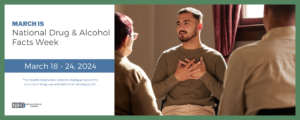
National Drug & Alcohol Facts Week | March 18 – 24, 2024
Key Facts
According to the CDC:
- Alcohol is the most commonly used substance among young people in the U.S.
- Underage drinking is a significant public health problem in the U.S. Excessive drinking is responsible for more than 3,900 deaths and 225,000 years of potential life lost among people under age 21 each year.
- About 1 in 5 emergency department visits associated with the misuse of prescription medicines also involved alcohol in 2016.2
- One in 7 Americans reports experiencing a substance use disorder.
Participate in National Drug and Alcohol Facts Week (NDAFW) this March 18th – March 24th and help share facts about drugs, alcohol, and addiction in your community. NDAFW is an annual, week-long health observance that inspires dialogue about the science of drug use and addiction among youth. NDAFW provides an opportunity to bring together scientists, students, educators, healthcare providers, and community partners to help advance the science and address youth drug and alcohol use in communities and nationwide. The misuse of alcohol, tobacco, illicit drugs, and prescription medications affect the health and well-being of millions of Americans.
Alcohol
Excessive drinking both in the form of heavy drinking or binge drinking, is associated with numerous health problems, including
- Chronic diseases such as High blood pressure, heart disease, stroke, liver disease, and digestive problems.
- Unintentional injuries, such as motor-vehicle traffic crashes, falls, drowning, burns, and firearm injuries.
- Learning and memory problems, including dementia and poor school performance.
- Violence, such as child maltreatment, homicide, sexual assault and suicide.
- Miscarriage and stillbirth or fetal alcohol spectrum disorders (FASDs) among pregnant women
- Alcohol use disorders.
Minimum Legal Drinking Age (MLDA) laws specify the legal age when an individual can purchase alcoholic beverages. The MLDA in the United States is 21 years.
Drugs
Different types of drugs can affect your body in different ways, and the effects associated with drugs can vary from person to person. As illegal drugs are not controlled substances the quality and strength may differ from one batch to another.
How a drug affects an individual is dependent on:
- body size
- general health
- the amount and strength of the drug
- whether any other drugs have been taken around the same time.
- a person’s mood or the environment they are in.
Drugs have short-term and long-term effects. These effects can be physical and psychological. Drugs can impact the way you think, feel and act. Making sure you know the risks can help reduce the potential harms you experience.
Alcohol and Other Substance Use
According to the CDC, Polysubstance use is when two or more substances are used together or within a short time period, either intentionally or unintentionally.
Polysubstance use involving alcohol includes drinking and using other substances such as marijuana, opioids, heroin or other illicit drugs, or medications not as prescribed. Whether intentional or not, using alcohol and other substances is unsafe because the effects may be stronger and more unpredictable than one drug alone, and even deadly.
Addiction
Addiction is a disease, not a character flaw. People suffering from substance use disorders have trouble controlling their drug use even though they know drugs are harmful.
Overcoming a substance use disorder is not as simple as resisting the temptation to take drugs through willpower alone. Recovery may involve medication to help with cravings and withdrawal as well as different forms of therapy. It may even require checking into a rehabilitation facility. Recovery can be challenging, but it is possible.
Quick Links
CDC | Alcohol and Public Health
